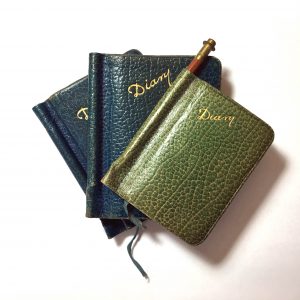
Included in T. S. Eliot’s personal papers is a collection of appointment diaries – small leather-covered pocket diaries which could fit in the breast pocket of a suit jacket or coat; some of them still have an accompanying pencil tucked in. These weren’t diaries to express thoughts or opinions, or to describe events of the day; they were diaries where Eliot noted meetings with poets, social events such as tea parties, suppers, and recitals, and meetings of the Faber & Faber Book Committee where manuscripts were discussed, accepted or rejected. They also include addresses; of friends, family, business acquaintances, dentists, and taxi firms. Tucked into the inside pockets are exactly what you might expect to find – business cards, stamps, travel tickets, scrappy notes. In 1932 a group of receipts for the Irish Free State Hospitals sweepstake for that year’s Grand National were kept safe in the back of the diary. Eliot’s passport number (and in later years that too of Valerie Eliot) was noted at the front of the diary.
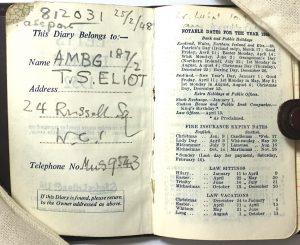
The diaries that remain with Eliot’s papers date from 1932, the year that saw him leave England for America to take up the Charles Eliot Norton lectureship at Harvard. The diaries often give us a snapshot view of what Eliot was up to and who he was seeing. In January 1932, he had engagements with Edith Sitwell, W. H. Auden, Ottoline Morrell, Ralph Hodgson, John Hayward, Rexi Culpin and his brother-in-law, Maurice Haigh-Wood. The following month Morrell, Hodgson and Culpin appear again, but also E. M. Forster and the Lockyers – friends of Eliot’s first wife, Vivien. There are four consecutive Sundays in March that year where Eliot has pencilled in ‘BBC’ for the recording of ‘The Modern Dilemma’ series of broadcast talks he delivered with moral philosopher John MacMurray and Christopher Dawson, a cultural historian. We can see some of the musical events Eliot attended: opera in April – a performance of Don Giovanni – and music in May – a recital of Beethoven’s IV Symphony. On Sunday 3rd of July the Eliots spent the day at Compayne Gardens (home to Vivien Eliot’s mother, Rose); Eliot has added an extra note in the ‘Weekend’ section of his diary, ‘Compayne / Hodgsons photos’. This is the day photographs were taken of the Eliots with Ralph Hodgson, Aurelia Bolliger and their dogs outside the house.
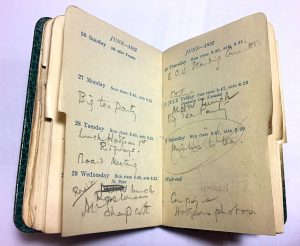
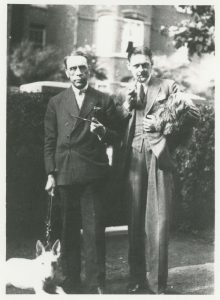
Like many of us, Eliot made odd notes in the back of his diaries, in particular, recommendations – of books, places to eat, food and drink. In 1936, Eliot noted ‘Rakørret with Swedish brandy’ – Rakørret is a Norwegian dish of salt-cured trout which is left to ferment for several months. Eliot was not shy of trying less-palatable dishes – he recommended a Norwegian cheese, Gammel Ost, ‘made of reindeer milk and then stored for years under the beds of Norwegian farm folk’ to his friend J. D. Aylward. Leaping forward to 1960, he has made a note of two cheese recommendations (here for more on Eliot’s love of cheese)– a Portuguese number ‘Caixa d’Estrella’ and ‘Boursault (?)’, a French cheese recommended by D. Herbert ‘who recommends also “Make me an offer” by Wolf Mankovitz’ (a story set among the Jewish community of London’s East End of the 1930s). On the same page Eliot has jotted down the date of Sir Bruce Richmond’s 90th birthday.
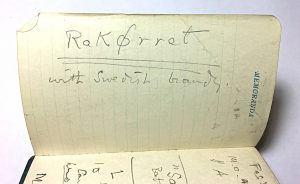
In August 1955 Eliot took a month’s holiday in Europe – three weeks in Switzerland, followed by a week in Provence where he stayed with his friend, and translator of many of his works, Henri Fluchère, and his wife Monique. The diary pages are all but blank during the month – as they so often are throughout the collection – except for the week in Provence where the food was evidently of great interest (and enjoyment) – Eliot made a note of several dishes throughout the week: these included Civet de lapin (rabbit stew), Coulis de tomates (strained tomato sauce), and Soupe au pistou (a classic Provençal vegetable soup). In his letter of thanks to Fluchère, Eliot writes ‘I enjoyed the cuisine Provençale… and I have fallen in love with that part of Provence and the perfumes of the countryside’ (3 September 1955).
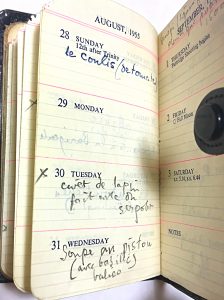
It’s clear that Eliot relied on the diaries during trips abroad, and they are particularly helpful for knowing whom he saw when he was in America – the pages are filled with appointments with American publishers, friends, family, and poetry readings. In 1945, Eliot is using a French diary and has made a list of French acquaintances under the heading ‘quartets’, most likely a list of people to whom he will send copies of Four Quartets following his British Council trip to Paris in May that year. That same year he also noted the days he would be on Fire Watch duty – one watch every twenty-one days from February to April. To-do lists from an American trip can be seen in the 1955 diary: ‘Ted Kauffer’s poster shd go to Westminster School of Art / Send Wm Levy Penguin Selected Prose / Send Horace Kallen signed photograph’ – all have been dutifully ticked off or crossed through.
Elements of Eliot’s life with his second wife, Valerie, can be seen in the later diaries. Shortly after their engagement, on 13 November 1956, Eliot has written “Roses VF”; the following two weeks include a meeting with Valerie at the Connaught Hotel and ‘tea + supper EVF’ at Valerie’s home. After their marriage in January 1957, Eliot notes special dates in their marriage: the 13th February – ‘Got Wedding Ring’ (the following year, ‘Anniversary of my wedding ring’), the 9th April – ‘move to 3kcg’ (the Eliot’s home in Kensington Court Gardens), and 12th September is recorded as the date ‘Valerie Fletcher started at F+F 1949’. In August 1958 they go to the Edinburgh Festival where The Elder Statesman is premiering. In his diary, Eliot lists the key events of each day, including performances by the Vegh quartet and Scottish National Orchestra.


